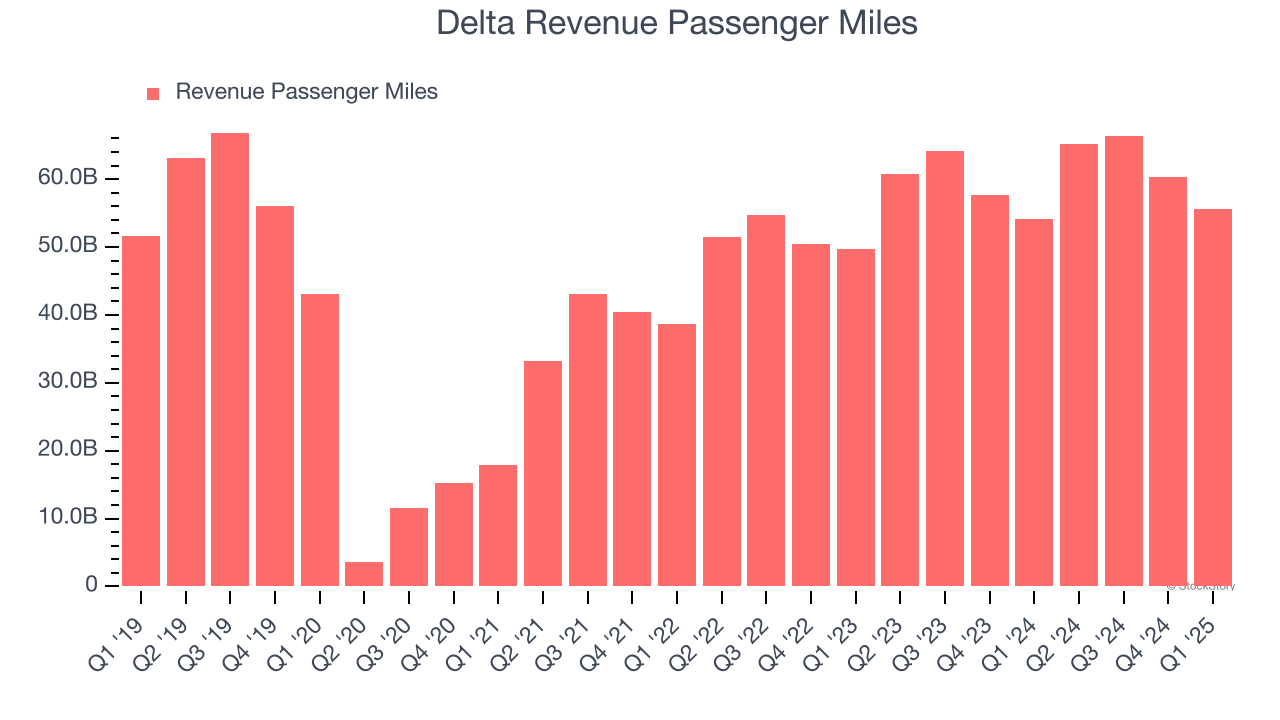
Over the last six months, Delta’s shares have sunk to $49.11, producing a disappointing 16.9% loss - a stark contrast to the S&P 500’s 5.6% gain. This might have investors contemplating their next move.
Is now the time to buy Delta, or should you be careful about including it in your portfolio? See what our analysts have to say in our full research report, it’s free.
Why Do We Think Delta Will Underperform?
Even with the cheaper entry price, we're cautious about Delta. Here are three reasons why there are better opportunities than DAL and a stock we'd rather own.
1. Weak Growth in Revenue Passenger Miles Points to Soft Demand
Revenue growth can be broken down into changes in price and volume (for companies like Delta, our preferred volume metric is revenue passenger miles). While both are important, the latter is the most critical to analyze because prices have a ceiling.
Delta’s revenue passenger miles came in at 55.68 billion in the latest quarter, and over the last two years, averaged 9.6% year-on-year growth. This performance was underwhelming and suggests it might have to lower prices or invest in product improvements to accelerate growth, factors that can hinder near-term profitability. 
2. Projected Revenue Growth Shows Limited Upside
Forecasted revenues by Wall Street analysts signal a company’s potential. Predictions may not always be accurate, but accelerating growth typically boosts valuation multiples and stock prices while slowing growth does the opposite.
Over the next 12 months, sell-side analysts expect Delta’s revenue to stall, a deceleration versus its 6.5% annualized growth for the past five years. This projection is underwhelming and implies its products and services will face some demand challenges.
3. Previous Growth Initiatives Have Lost Money
Growth gives us insight into a company’s long-term potential, but how capital-efficient was that growth? Enter ROIC, a metric showing how much operating profit a company generates relative to the money it has raised (debt and equity).
Delta’s five-year average ROIC was negative 1.1%, meaning management lost money while trying to expand the business. Its returns were among the worst in the consumer discretionary sector.
Final Judgment
Delta doesn’t pass our quality test. Following the recent decline, the stock trades at 8× forward P/E (or $49.11 per share). While this valuation is optically cheap, the potential downside is huge given its shaky fundamentals. There are better stocks to buy right now. We’d recommend looking at one of Charlie Munger’s all-time favorite businesses.
High-Quality Stocks for All Market Conditions
The market surged in 2024 and reached record highs after Donald Trump’s presidential victory in November, but questions about new economic policies are adding much uncertainty for 2025.
While the crowd speculates what might happen next, we’re homing in on the companies that can succeed regardless of the political or macroeconomic environment. Put yourself in the driver’s seat and build a durable portfolio by checking out our Top 6 Stocks for this week. This is a curated list of our High Quality stocks that have generated a market-beating return of 183% over the last five years (as of March 31st 2025).
Stocks that made our list in 2020 include now familiar names such as Nvidia (+1,545% between March 2020 and March 2025) as well as under-the-radar businesses like the once-micro-cap company Tecnoglass (+1,754% five-year return). Find your next big winner with StockStory today.




